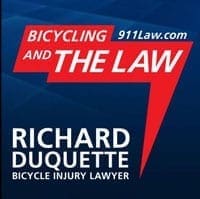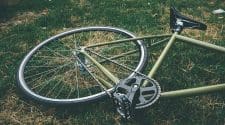By Richard Duquette, Esq, Law Firm of Richard Duquette
Listen to the Podcast
In bicycle injury cases, plaintiffs are entitled to more than just their medical bills. There are a variety of different types of compensable damages to which injured plaintiffs may be legally entitled. This two-part article focuses on lost earning capacity—one of the more easily overlooked and undervalued categories of damages.
Because insurers have an interest in minimizing their total exposure, they often focus on medical bills (which are sometimes discounted for one reason or another), and stonewall demands for additional payments due to lost earning capacity and other damages. They use this tactic to pressure an injured plaintiff to settle for less than what their case is worth.
Part One of this article discusses how lost earning capacity works as a general matter (in a civilian context). Part Two explores the unique challenges of making a lost-earning capacity argument with an injured plaintiff who is in active military service. But first, we need to provide some general background.
Special Damages vs. General Damages
There are two basic categories of damages in a personal injury case: special damages and general damages. Special damages refer to the direct, quantifiable pecuniary loss that can be traced to the accident. These are often referred to as “out of pocket losses” or “economic damages.” This includes past medical bills, prescriptions, other medical expenses such as future care, and actual lost wages.
General damages, on the other hand, refer to other, less readily quantifiable losses such as pain and suffering, diminished quality of life, and emotional distress. Other examples (discussed in our WRONGFUL DEATH SERIES include things like loss of love, emotional support, and companionship in the case of a bereaved family. These are often referred to as “non-economic damages. However, as we explain below, it is not strictly accurate to call all of these damages “non-economic.” Many of these damages do have economic value. But they fall into the “general” category because they cannot be quantified as simply as adding up medical bills, lost past wages, and property damage bills.
Lost wages vs. Lost Earning Capacity
Given the above explanation, you may be surprised to learn that lost earning capacity is classified with general damages rather than special damages. But although it involves actual economic loss, lost earning capacity is categorized as a “general” damage because of its forward-looking and somewhat uncertain character. Connoly v. Pre-Mixed Concrete Co., 489 Cal.2d. 487 (1957). Consequently, damages may be awarded for lost earning capacity without any proof of actual loss of earnings. See Heiner v. KMART Corp., 84 Cal.App.4th 335 (2000). These are general damages because in the words of Civil Code §3283, they are “certain to result in the future.”
By contrast, lost wages are categorized as special damages because they reflect the amount of money a person would have made in the time they had to miss work due to their injury. This is a quantifiable past economic loss that requires proof of the plaintiff’s pre-injury wage rate and the amount of time they missed at work.
Proving Lost Earning Capacity
Despite the language of “certainty” in the Civil Code referenced above, lost earning capacity does not require actual certainty (because this is an impossible showing). All a plaintiff must show is that some lost earning capacity is “reasonably certain” to occur. After meeting this threshold, the plaintiff must show the amount of lost earning capacity to a reasonable degree of probability. Licudine v. Cedars-Sinai Medical Center, 3 Cal.App.5th 881 (2016).
This rule has the effect of both allowing for projected future income in the absence of an injury in cases of plaintiffs who have not yet attained that level of income, and of allowing for projected future losses when the loss is likely but has not yet been actualized.
Defense arguments about the speculative nature of lost earning capacity damages have been rejected in case after case. In Connoly (cited above), the court awarded future lost income to a young tennis player whose injuries made her unable to pursue her professional career, rejecting claims that these losses were speculative. Indeed, the model jury instructions clearly state that “it is not necessary that [the plaintiff] have a work history.”
In Niles v. City of San Rafael, the court awarded lost future income based on anticipated lifespan to a minor who was injured despite uncertainty about his actual future income capacity. Niles v. City of San Rafael (1974) 42 Cal.App.3d 230, at 241-242.
In Lang v. Barry, (1945) 71 Cal.App.2d 121, a jury award of lost future income to an injured minor plaintiff who was disqualified from regular military service but “had been accepted only for limited service as a specialist” was upheld as reasonable.
In Gargir v. Akiva, (1998) 66 Cal.App.4th 1269, a young female who aspired to be a special needs teacher but had not even begun college at the time was awarded damages for lost future earning capacity because her knee injury would likely hinder her ability to fulfill this role. The court cited the fact that such a career required mobility and dexterity as relevant in this determination. In other words, the likeliness that an injury may make one less likely to be able to satisfy the physical demands of their chosen career in the future is grounds for an award of lost future earning capacity.
Additionally, Hilliard v. A.H. Robins Co., (1983) 148 Cal.App.3d 374 upheld a lost future earnings award to a young woman who was not working at the time of her injuries.
Each of the cases cited above emphasizes that lost future earning capacity awards do not require proof of actual lost earning. This is reasonable. The term “capacity” is significant in such awards. They are by definition somewhat speculative, but it is possible to reasonably project lost future income based on both the plaintiff’s pre-injury earning potential (i.e. the ceiling), and the effects of an injury on a plaintiff.
Many of the cases focus on the speculative future earning capacity of plaintiffs who had not yet begun to realize that capacity. But the principle that proof of actual (present) loss of earning capacity need not be given is equally applicable to a situation in which the plaintiff has already achieved much in their career, but the extent to which their injury will limit their future advancement is not yet known. The burden of proof is simply this: The plaintiff must show that it is reasonably certain they will suffer some lost earning capacity, and the award must reflect an amount that is reasonably probable.
Conclusion
Lost earning capacity claims can be tricky, often requiring the expert testimony of an economist, as well as a great deal of personal information about the plaintiff’s academic history, work history, future prospects, and difficult questions about the extent to which the injury will prevent them from realizing these prospects. But they can also add significant value to a case in which the medical expenses and other out of pocket losses are not very large. Don’t sell your case short. If you’ve been in a bicycle accident and suffered an injury that may have a long-term affect on your career, don’t let these hidden damages go unclaimed. Contact the experienced professionals at the Law Firm of Richard Duquette and allow him to fully litigate your case. Mr. Duquette will leave no stone unturned in determining the damages to which you are entitled. Don’t accept a lowball settlement just because your medical bills aren’t very high. Contact Mr. Duquette today for a full case evaluation that takes all of your legal remedies into account
About the Law Firm of Richard L. Duquette
The Law Firm of Richard Duquette has recovered millions in damages for injured bicyclists since 1983. Attorney Duquette is an experienced bicyclist himself and has dedicated his practice to helping this community. He is experienced in all types of cases involving bicycle crashes, injuries, and other legal troubles.
Mr. Duquette serves a wide variety of bicyclists. Whether you prefer road cycling, mountain biking, track riding, Randonneuring, E-Bicycles, Handcycles, Century Rides, Triathlons, Duathlons, or Criterium, Mr. Duquette knows how to best serve your legal needs regardless of the type of bicyclist you are.
Mr. Duquette is an expert at maximizing, proving, and recovering damages.
For more information please visit the Law Firm of Richard Duquette.
The information in this article is for general information purposes only. The focus of this article is on California Law. You should contact an attorney in your state for case-specific advice, as details of the law and procedural requirements vary from state to state. Nothing in this article should be taken as legal advice for any individual case or situation. This information is not intended to create an attorney-client relationship; and the receipt, reading, listening, or viewing of this content shall not constitute an attorney-client relationship. Nothing in this article shall be construed as a warrant, promise, or guarantee about the outcome of your case or any other matter. This information may contain personal impressions or statements of opinion on a subject that do not apply in your case. Further, statements of law reflect the current state of the law at the time of writing and/or recording, and may not reflect subsequent changes in the law.















